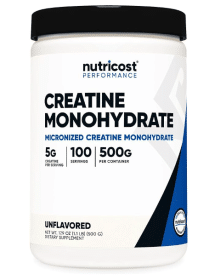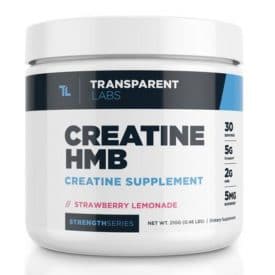Creatine is amongst the most extensively researched supplements on the market for good reason.
Creatine is well known as a natural compound found in the body and in sources such as fish, red meat, and seafood. Bodybuilders, athletes, and fitness enthusiasts utilize creatine to increase muscle mass, strength, and exercise capacity. Studies indicate that creatine boosts athletic performance and offers therapeutic and health benefits, ultimately enhancing overall quality of life (1). Extensive research has consistently demonstrated that creatine is safe for long-term use.
As a premier supplement with substantial advantages for athletes, it’s no wonder various forms of creatine are available on the market. However, selecting the most effective type for optimal results can be daunting, especially for athletes and fitness enthusiasts trying to choose between creatine monohydrate and micronized creatine.
In this post, we explore the distinctions between creatine monohydrate and micronized creatine, equipping you with the necessary information to make an informed choice to enhance your workout performance. Additionally, we delve into creatine’s role in training and recommend reputable brands to consider. Read on to discover more!
Overview — What Is Creatine?
Creatine naturally occurs in the body’s cells and helps the muscles to produce energy, especially during challenging and intensive exercises. However, it’s essential to note that creatine doesn’t build muscle. Only with proper diet and resistance training, alongside supplementing with creatine, can one build and preserve muscle mass.
Organs like the pancreas, liver, and kidneys produce creatine. You can also get creatine from external sources like meat, fish, and seafood. The body converts creatine to phosphocreatine, which is stored in the muscles and used as a source of ATP for energy.
Benefits
The benefits of creatine can’t be overemphasized. Many years of research show that it’s a go-to supplement for athletes. Below are some benefits of creatine.
Increased Muscle Mass & Strength
Creatine is a very effective supplement for adding muscle mass and building strength. Taking it with the proper exercise and diet can improve your body composition. 95% of the creatine in your body is stored in your muscles, so if you lack creatine from other sources like meat and fish, you can supplement it with external creatine. This study reveals that creatine is an efficient supplementation for muscle growth if you add adequate training (2).
Helps Cells Produce Energy & Improve Exercise Performance
When ingested, creatine turns to phosphocreatine. Phosphocreatine helps create adenosine triphosphate (ATP), stored in cells and used for energy (3). The more energy you have, the better your exercise performance.
Better Muscle Recovery
Your muscles get fatigued and sore, especially after intense exercises. Sometimes, it can take a long time to recover. Taking creatine helps with faster muscle recovery and reduces the effects of muscle damage (4).
Proper Brain Function
Athletes who take this supplement have better brain health and function. The brain requires many ATPs to perform arduous tasks (5). Taking creatine can help boost phosphocreatine stores and produce more ATPs. For older people, it can help improve memory and recall ability.
Other benefits of creatine include:
- It’s safe to use with minimal side effects.
- It helps improve exercise performance.
- It can help treat diseases.
Creatine Monohydrate
Creatine monohydrate is the most common type of creatine supplement. It’s pure 100% creatine and affordable compared to other creatine options.
Pros
- It’s affordable
- It’s safe to use with minimal side effects.
- It can help improve cognitive function.
- It helps reduce the risk of injuries.
- It helps supply energy to cells to help with intense activities and workouts.
Cons
- It’s not readily soluble.
- Creatine can cause bloating because it causes water retention. This can disadvantage athletes looking to maintain their ideal body weight.
- Taking creatine monohydrate can cause cramping, especially during exercises. This is because of electrolyte imbalances caused by water retention.
Micronized Creatine
Micronized creatine is a type of monohydrate refined into smaller creatine particles, making it easy for the body to absorb. These particles are 20 times smaller than creatine monohydrate.
Pros
Micronized creatine as a form of creatine monohydrate offers the same pros. It also offers the following additional benefits:
- It’s easier to absorb
- Highly soluble
Cons
- It can cause bloating.
- It comes in only one form, which is powdered.
Creatine Monohydrate Vs. Micronized Creatine
Now, let’s settle the creatine monohydrate vs. micronized creatine debate. Micronized creatine supplements are a more refined form of creatine from creatine monohydrate. So, though both supplements have similar functions, they still have a few differences.
| Creatine Monohydrate | Micronized Creatine |
| Standard size | 20 times smaller than usual creatine |
| In powder form, clump, and leave residue | It’s highly soluble and leaves no residue |
| It comes in powder, capsules, or pills | It comes in only fine powder |
Best Creatine Monohydrate & Micronized Creatine
Creatine monohydrate might be the best option for some people because they can easily pop the capsule or pills. Others might prefer micronized creatine because the fine powder mixes better and doesn’t leave behind residue. Whatever your decision, below are two trusted creatine monohydrate and micronized creatine brands you can use while training:
- Nutricost Creatine Monohydrate (Micronized)
- Transparent Labs Creatine Monohydrate
Nutricost Creatine Monohydrate (Micronized)
Get all of the benefits of micronized creatine without breaking the bank and activate muscle building quickly.
Nutricost Creatine Monohydrate is 100% pure creatine with no artificial ingredients or additives. This creatine supplement is micronized, which means the particles are much smaller than the standard creatine monohydrate.
If you’re a strength athlete, bodybuilder, or just looking to stay healthy, this product is worth adding to your supplement list. It’s affordable, and for just $23.95, you get 500 grams per container for 76 servings.
Transparent Labs Creatine Monohydrate
Transparent Labs Creatine HMB is clean and effective for tackling all of your strength building needs. With no artificial additives or preservatives, what you get is pure creatine with added HMB for better strength.
Transparent Labs Creatine HMB combines creatine monohydrate and beta-hydroxy-beta-methylbutyrate (HMB), a natural metabolite. This supplement promotes muscle growth and strength while still managing to reduce fats. It also contains BioPerine, which helps with easy absorption.
Transparent Labs is safe to use and contains no artificial sweeteners. With just $49.99, you get 210 grams per container for 30 servings.
Wrap Up
Numerous studies have demonstrated that creatine is a powerful supplement athletes can use to enhance their exercise performance. While most research focuses on creatine monohydrate, micronized creatine offers the same benefits with a finer particle size. When selecting a product, remember that the goal is to find the right one that aligns with your fitness objectives. This article showcases two outstanding creatine products: creatine monohydrate vs. micronized. Explore these choices, give one a try, and witness the remarkable improvements in your workouts.
Follow Generation Iron on Instagram, Facebook, and Twitter for more supplement reviews!
References
- Kreider, R. B., & Stout, J. R. (2021). Creatine in Health and Disease. Nutrients, 13(2), 447. https://doi.org/10.3390/nu13020447
- Wu, S. H., Chen, K. L., Hsu, C., Chen, H. C., Chen, J. Y., Yu, S. Y., & Shiu, Y. J. (2022). Creatine Supplementation for Muscle Growth: A Scoping Review of Randomized Clinical Trials from 2012 to 2021. Nutrients, 14(6), 1255. https://doi.org/10.3390/nu14061255
- Persky, A. M., & Brazeau, G. A. (2001). Clinical pharmacology of the dietary supplement creatine monohydrate. Pharmacological reviews, 53(2), 161–176.
- Wax, B., Kerksick, C. M., Jagim, A. R., Mayo, J. J., Lyons, B. C., & Kreider, R. B. (2021). Creatine for Exercise and Sports Performance, with Recovery Considerations for Healthy Populations. Nutrients, 13(6), 1915. https://doi.org/10.3390/nu13061915
- Rae, C., Digney, A. L., McEwan, S. R., & Bates, T. C. (2003). Oral creatine monohydrate supplementation improves brain performance: a double-blind, placebo-controlled, cross-over trial. Proceedings. Biological sciences, 270(1529), 2147–2150. https://doi.org/10.1098/rspb.2003.2492










